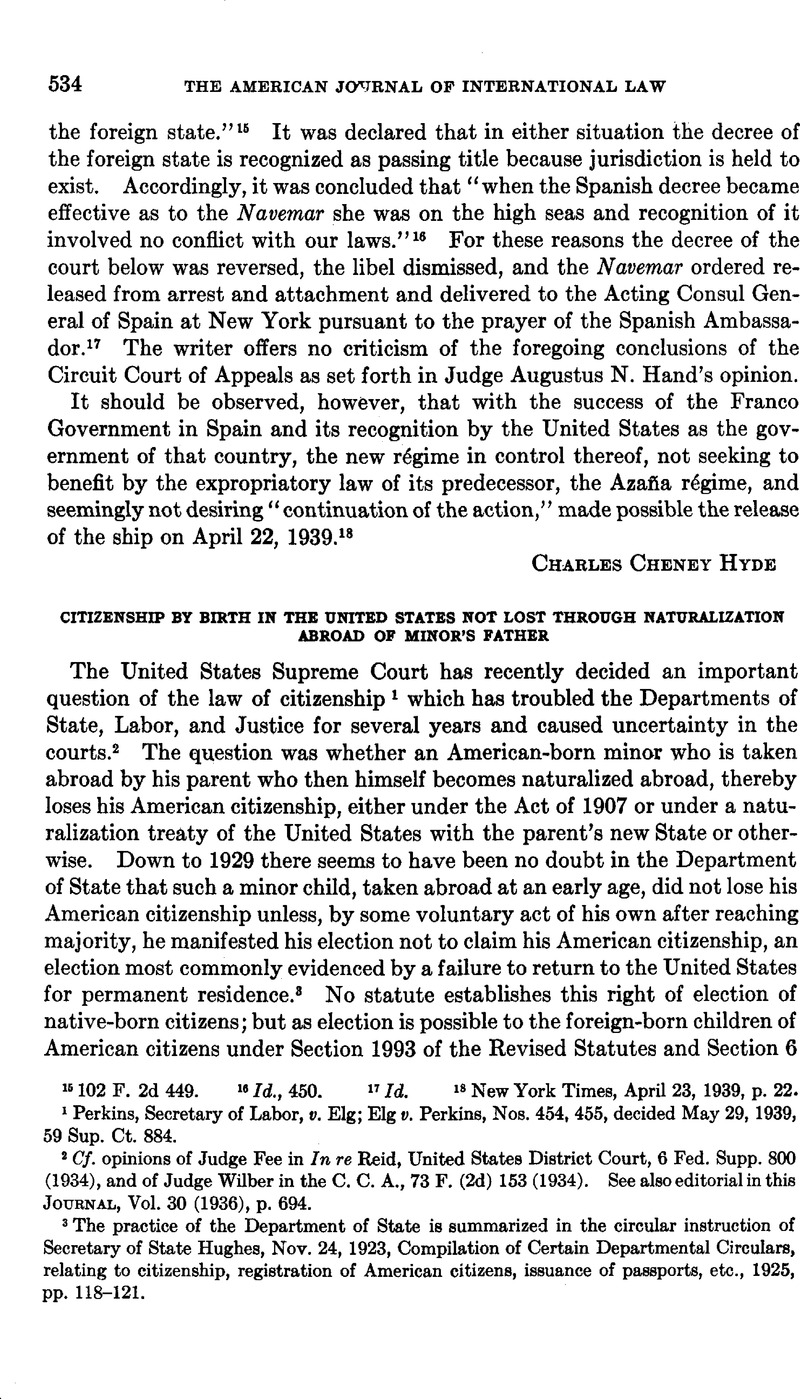No CrossRef data available.
Article contents
Citizenship by Birth in the United States Not Lost Through Naturalization Abroad of Minor’s Father
Published online by Cambridge University Press: 12 April 2017
Abstract

- Type
- Editorial Comment
- Information
- Copyright
- Copyright © American Society of International Law 1939
References
1 Perkins, Secretary of Labor, ». Elg; Elg ». Perkins, Nos. 454, 455, decided May 29, 1939, 59 Sup. Ct. 884.
2 Cf. opinions of Judge Fee in In re Reid, United States District Court, 6 Fed. Supp. 800 (1934), and of Judge Wilber in the C. C. A., 73 F. (2d) 153 (1934). See also editorial in this Journal, Vol. 30 (1936), p. 694.
3 The practice of the Department of State is summarized in the circular instruction of Secretary of State Hughes, Nov. 24, 1923, Compilation of Certain Departmental Circulars, relating to citizenship, registration of American citizens, issuance of passports, etc., 1925, pp. 118-121.
4 Where only one parent is a citizen, the child must, in order to claim American citizenship, return to the United States before reaching the age of 13, reside here continuously for five years, and within six months after reaching majority take the oath of allegiance. Act of May 24,1934, 48 Stat. 797. In view of the presumably continued existence of Sec. 6 of the Act of March 2, 1907 (34 Stat. 1229), providing that, in order to receive diplomatic protection the child born abroad under Sec. 1993 must, on reaching the age of 18, record his intent to become a resident and remain a citizen of the United States, and to take the oath of allegiance on attaining majority, it may be that the original unamended Sec. 1993 may still be deemed to apply to children both of whose parents are American citizens. The amended section evidently contemplates different treatment in such case. Although Sec. 6 of the Act of 1907 looks only to protection, it has been construed, probably inaccurately, as limiting citizenship. Cf. Proposed Code of Nationality Laws, Sec. 201 (c), Pt. 1, p. 9.
5 These rulings of Secretaries of State and Attorneys General, beginning with the well-known opinion in Steinkauler’s case, 15 Op. Attys. Gen. 15 (1875), are to be found in Moore’s Digest, III, 532 et seq. Several of them are quoted by the Supreme Court in the Elg case. While the non-returning foreign-born American citizen may of course be deprived of diplomatic protection, the deprivation of citizenship under the Act of May 24, 1934, only extends to foreign-born children one of whose parents is an alien.
6 36 Op. Atty. Gen. 535 (1932).
7 This opinion, like that of the Commissioner of Immigration in the Elg case and of the Bureau of Naturalization and of the Circuit Court of Appeals in the Reid case, to be dis cussed presently, was criticized in this Journal, Vol. 30 (1936), pp. 694-701.
8 This case is described in this Journal, ibid., p. 695 et seq.
9 Supra, note 2.
10 99 F. (2d) 408 (1938).
11 169 U. S. 649 (1898).
12 Supra, note 4.
13 Joint Resolution of May 18, 1898. This was considered by some as a Congressional admission that Miss Grant had been expatriated by her marriage to a British subject, Sartoris. This Journal, Vol. 29 (1935), p. 396, at p. 411.
14 Cf. “The Citizenship of Native-Born American Women Who Married Foreigners before March 2, 1907, and Acquired a Foreign Domicile,” this Journal, ibid., p. 396.
15 A declaratory decree against a responsible defendant serves all the purposes of a coercive remedy, like injunction or mandamus, while avoiding all the technical pitfalls of such a remedy. It is not conceivable that a government official would defy a declaratory judgment, but if that should happen, supplementary coercive relief is available.
16 The final decision of Judge Jennings Bailey, United States District Court for the District of Columbia, of Jan. 25, 1937, is unreported, but the hearing of Dec. 7, 1936, on the demurrer is reported in 64 Wash. L. Rep. 1098-1100 (1936) and gives an adequate description of the disposition of the case.
17 The Proposed Code of Nationality Laws rests on the theory that a parent’s loss of American citizenship carries along with it that of a minor child who acquires the parent’s nationality under the foreign law. Cf. Sec. 405, Pt. 1, p. 77.




